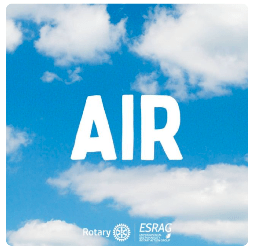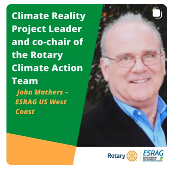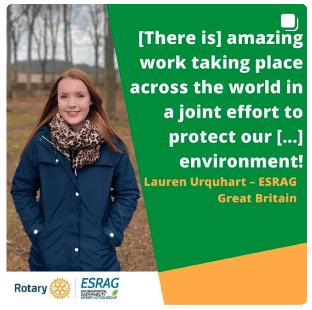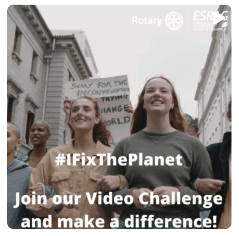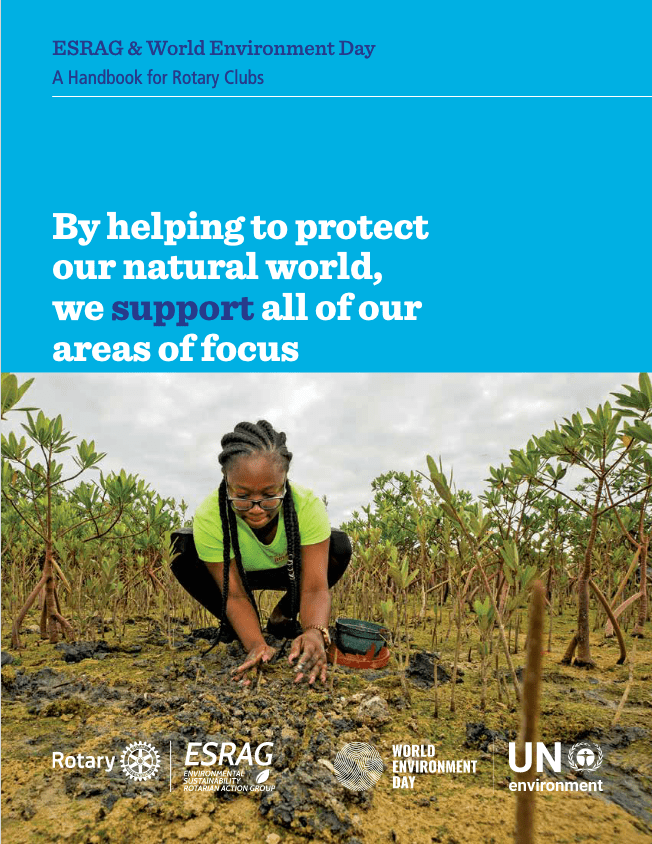Rotary’s Environmental History
The evolution of Preserve Planet Earth, as chronicled by changes
recorded in the Minutes of the Board of Directors, through
to the addition of the 7th area of focus: Protecting the Environment.

[Author’s note – This article, like much of the content of any webpage is a ‘work in progress.’ Much of the information has been gleaned from the Boards action as succinctly recorded in the Official Minutes of the Board of Directors and content from the Rotarian Magazine. The Rotary Archives had little additional information, and I have not interviewed any of the participants. The actual language of the Minutes is available from the Rotary Archives. The interpretation is my own, and I welcome correction and additions. Karen D. Kendrick-Hands, November 1, 2019.]
In July 1990, the Rotary International board of directors resolved to celebrate November 1 as Rotary Ecology Day, ‘such day to include activities and projects appropriate to the locality or region.’ Who knew that Rotarians were once invited to celebrate Rotary Ecology Day, and why don’t we do that anymore?
Observing Rotary Ecology Day was a small part of Rotary International President (RIP) Paulo Costa’s Preserve Planet Earth (PPE) Program with its five ambitious and but timely goals for Rotary to claim its place on the world stage of the environmental movement.

FIVE ORIGINAL GOALS OF PPE 1990-93
- Promote greater awareness among all Rotarians of the critical environmental issues affecting their communities, countries, and the world.
- Increase the number and diversity of environmental service projects and workshops carried out by clubs and districts;
- Incorporate environmental components in all Rotary service to ensure that these projects support sustainable development
- Developworldwide a public image of Rotary clubs as environmental advocates within their communities.
- Identify reputable environmental groups with Rotary clubs and districts may coordinate effective environmental projects.
The Rotary PPE initiative was well supported. In addition to declaring November 1 as Rotary Ecology Day, RI published a well-funded bi-monthly Newsletter — “The Green Wave” and produced a video — “We are the Guardians” in multiple languages. The RI archives no longer have a copy in English – only Portuguese. RI even developed a special logo, which is a protected mark of Rotary to this day.
During RIP Paulo Costa’s term, RI hosted four seminars around the world, which bring to mind the current practice of Presidential Conferences.
Air – Chicago USA – August 24-25, 1990
Flora – Manaus, Brazil – November 8-10, 1990
Fauna – Arusha, Turkey February 8-9, 1991
Water – Amsterdam, Netherlands May 10-11, 1991
Ultimately the Fauna and Water conferences had to be combined and held May9-12 because of the Persian Gulf War.
The July 1990 Rotarian kicked off the theme of the year. The August 1990 Rotarian created a special section: “Protecting our Environment,” – including “101 Ways you can help Preserve Planet Earth.”
The Board agreed to review this practice [of observing Rotary Ecology Day – and much of the rest of the program] at its second meeting in 1992- 93.” Alas, the original Rotary Ecology Day did not survive that review and there was no mandate to continue its observance within Rotary after 1993, which is probably why most Rotarians, even dedicated environmentalists and ESRAG members have never heard of it. Nor did the Pilot itself survive as an RI Board-led initiative to commit to developing “worldwide a public image of Rotary clubs as environmental advocates within their communities.” Through the years, the Board-led emphasis for PPE has gradually eroded.
As early as November 1990, after hearing the report of the newly formed PPE Committee, the weakening of the Program’s foundations seem to have begun. According to the November 1990 Board minutes, the Board made multiple changes to the July 1990 Decision that arguably weakened the initially robust five-point Program. The five main purposes were re-ordered and many were rewritten:
The November revisions state:
GOALS FOR 1990-91
- Motivate Rotarians — and through them, others — to practice environmentally sound life styles [Not in original].
- Increase the number and diversity of environmental service projects [deleted ‘and workshops’] carried out by clubs and districts and encourage inter-club cooperation in preserving plant earth [added ‘notion of inter-club cooperation’].
- Incorporate environmental components in all Rotary service [added <projects>] to ensure that these projects <added ‘conform with the purpose of the preserve planet earth program’> the <language> replaced ‘Support sustainable development.’]
- Develop a worldwide image of Rotary clubs and Rotarians as environmentally concerned organizations and persons dedicated to preserving planet earth. [This new language replaced ‘Develop worldwide a Public image of Rotary clubs as environmental advocates within their communities’]
- Promote greater awareness among all Rotarians of the critical environmental issues affecting their communities, countries, and the world.
[omitted ‘Identify reputable environmental groups with which Rotary clubs and districts may coordinate effective environmental projects;’]
Thus, ambiguous language about motivating “environmentally sound lifestyles’ appeared. ‘Community workshops ‘ were eliminated as a service opportunity. The robust notion of supporting sustainable development – a phrase in play and well understood in the environmental community was replaced with the internally-looking goal of ‘conforming to the purposes of the PPE program.’ The notion of Rotary clubs rising as environmental advocates within their community disappeared. To this day, Rotary prefers projects to advocacy, even though many environmental problems benefit from both advocacy and action.
The reference to identifying “reputable environmental groups with which Rotary clubs and districts may coordinate effective environmental projects,” was totally deleted. The November revisions introduced the notion of “Balanced Development” defined as “that continuing process of economic and social development, in both developing and industrialized nations, that meets the needs of the present without compromising the ability of future generations to meet their own needs.” The change raises the question whether the notion of “Balanced Development” is just a way of defining sustainable development – or a retreat from it?
In 1992, the Board approved Resolution 92-287, proposed by the RC of Jönköppings, Sweden, and passed by the Council on Legislation, as republished in the first codification of the RI Code of Policies,v1998,
Article 42 Community Service
42.020. Environmental Protection
42.020.1. Protecting the Environment
As they are in a unique position to bring these facts to the attention of government leaders, communities and industries, clubs shall be encouraged to help create better and necessary living conditions, make it possible for our earth to survive as a good place for mankind, and give emphasis to the protection and improvement of the environment in their community and World Community Service projects.
It is the responsibility of every Rotarian to support action directed at improving the environment and protecting animals and plants from extinction.
(Jun. 1998 Mtg., Bd. Dec. 348____)
Source: COL 92-287
This language continued in all subsequent RI Code Of Policies until the many programs were consolidated into 6 Areas of Focus in 2010, which did not include the environment as one of the Areas of Focus:
In 1993, at the end of the three year pilot, the Board decided that PPE could continue as “a recommended activity for clubs and districts” and encouraged “all Governors to appoint district Preserve Planet Earth Committees.” . . . but the RI Board seemed to be backing away from making environmental emphasis a part of Rotary’s DNA. The General Secretary was charged to work “closely with the PPE task force to promote greater awareness of environmental issues and increased participation of clubs and districts in projects which address these issues.” [Item 253, Minutes of May 1993 Board of Directors Meeting, p13.]
In July, 1995, the RI Board acted to implement Resolution 95-165 “to encourage all districts and clubs to support efforts which help people to provide themselves with safe water reasonably close to their homes using simple sustainable technology.” The RI Board included PPE Committees as a resource to help meet the Presidential Goal of initiating 5000 new water wells. [Item 24, Minutes of the July 1995 Board of Directors’ Meeting, p.6.]
In November, 1996, as a result of the triennial review of PPE, the Board directed maintenance of continued support of PPE Program, and expanded coverage in the Rotarian and other publications and on the Rotary webpage. The RI President Elect and future presidents were invited “to consider PPE as a topic for discussion at RICON and the International Assembly.” This was a much less prominent RI commitment than the original 1990 program. The Board also asked the Secretary General to study the feasibility of free distribution of a PPE Handbook to every club that requested it. Ultimately, 10,000 were actually printed.
The Preserve Planet Earth Handbook (undated but produced no earlier than 1998) was a 26-page publication with great ideas, and examples of compelling club projects from around the world that demonstrated those ideas in practice. That was the last guide to environmental projects published by Rotary International until the ESRAG-UNEP Handbook from May 2019.
In a terminology simplification that the Board adopted August 1999, PPE was not granted the higher status of a “Structured Program.” Instead it was grouped with several other programs on a “Menu of Service Opportunities.” While many of the other themes on the Menu have since evolved to ‘Area of Focus’ status, alas PPE did not. [Item 61, Minutes of the August 1999 RI Board of Directors Meeting, pp 8-9.] By this action PPE became just one of many possibilities grouped as Community Service – (The Community Service Projects Manual only mentions Preserve Planet Earth as part of a longer list.) By now the upper leadership of RI no longer saw Preserve Planet Earth as driving the vision for RI to be a ‘world player’ on the environmental stage.
In June 2001, Resolution 01- 254 asked the Board to encourage ‘Rotarians to promote “Preserve Planet Earth” by planting and fostering plants.’ The Board did exactly that – and nothing more expansive than that. [Item 358, Minutes of the June 2001 Board of Directors Meeting, p.17].
By 2003, PPE was clearly seen as a local endeavor. The Board encouraged clubs and districts to “identify, address and undertake environmental projects to meet the needs of their communities, utilize the Internet to promote projects and appoint a club level “Preserve Planet Earth Committee” to communicate the importance of environmental-related issues through training and clubs visits, working with local organization, conducting surveys and educating youth and to work with “other reputable organizations with similar environmental goals . . .” The board however, did not implement the recommendation to include community service workshops on PPE in the International Assembly program. [Items 248 and 249, PPE Activities, Minutes February 2003 Board of Directors Meeting, p 16]
In 2010, even The Menu of Service Opportunities was eliminated from the RI Code of Policies, and with it, the last vestiges of PPE would have been swept away — if not for RI Director Hallage from Curitiba, Brazil, who asked that RI maintain PPE. The Board amended Code of Policies, Article 8- Club Programs, where to this day, PPE continues as a mere shadow of its original grand vision:
“Preserve Planet Earth encourages Rotary clubs to promote awareness among Rotarians and increase the number of environmental service projects. These activities are part [of] the third avenue of service, Community Service.”
RI Code of Policies, Section 8.040.4.
Nevertheless, the legacy of the original bold initiative continues to thrive in clubs and districts throughout the Rotary world. For example, the RC of Boulder, Colorado, USA, has maintained its PPE committee since the Program was launched, planting thousands of trees, producing an “Environmental Green Pages” and more recently creating Reusable water filling stations in eight area schools, and establishing Blue Star Recyclers where workers on the Autism spectrum recycle older computers. Its many projects frequently featured in the Rotarian magazine through the years. e.g. The Rotarian, August, 1999, pp. 33-35.
As recently as 2015, the RC of Hong Kong South, District 3450, petitioned the RI Board “to consider adopting a standard environmental policy and recommending that districts and clubs appoint a Preserve Planet Earth Chair, but the Board’s decision was not recorded. [Item 103- Petitions to the Board, Minutes of the January 2106 RI Board of Directors Meeting, p3.] District 3450 maintains an active PPE Facebook page.
A quick google search: Preserve Planet Earth Rotary reveals many links to other PPE Committees and projects.
here is an incomplete, random list. Should your PPE Committee or project be listed here? Send an update to [email protected].
Rotary Club of Portland, Oregon, USA
Rotary Club of Lancaster, Pennsylvania, USA
RI D9600 – Queensland Australia, Nauru, Papua, New Guinea and Solomon Islands
Does your club or district have a PPE committee or ongoing PPE projects? ESRAG wants to know. Contact [email protected] with updates of your activities, and as much history as you can share.
2020 marks the 30th anniversary of RIP Paulo Costa’s timely and urgent vision. The environment outpolls many other causes as something Rotaractors – the future of Rotary—see as causes their “ideal organization” would emphasize. Indeed with the “next generation” only Literacy and Community economic development rank higher. YOUR VISION FOR ROTARY’S FUTURE: A Report of the 2017 Triennial Strategic Planning Survey, pp. 39-40 Fig. 48.
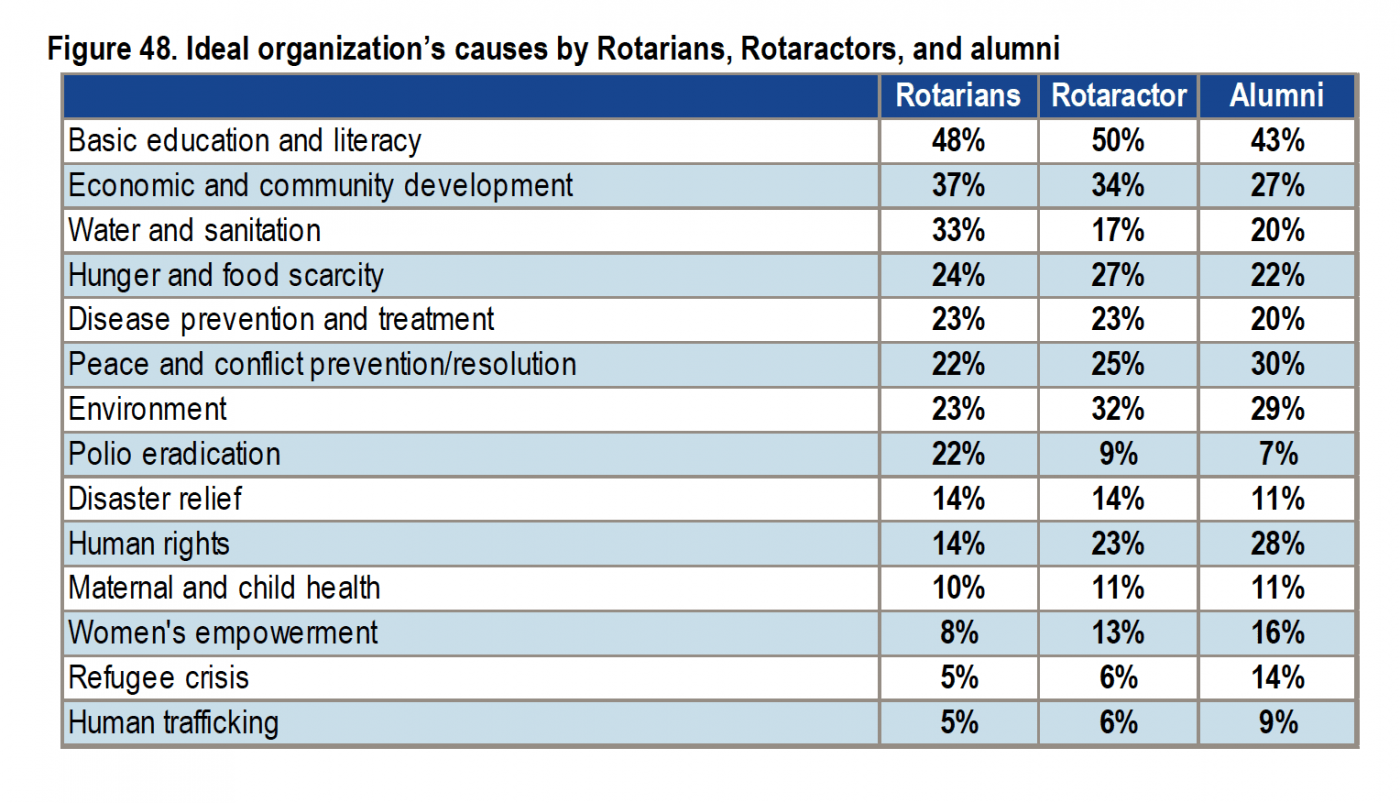
Let’s work to celebrate Rotary Ecology Day 2020 by persuading Rotary International leadership to fully and vigorously reinstate the PPE program as originally conceived and adopted — our Planet Earth deserves nothing less from the selfless service of Rotarians. Might you be interested in developing and advancing a resolution to for the RI Board and TRF to reinstate the original PPE Program? Please contact our Council on Resolutions coordinator, Rodney Huggins. Even if you’re reading this on November 2, it’s not too late to wish your friends – a Happy Rotary Ecology Day – but no need for greeting cards or gift wrap. Rather, let’s build awareness of Preserve Planet Earth, and work to restore the 1990 program to its original vision.
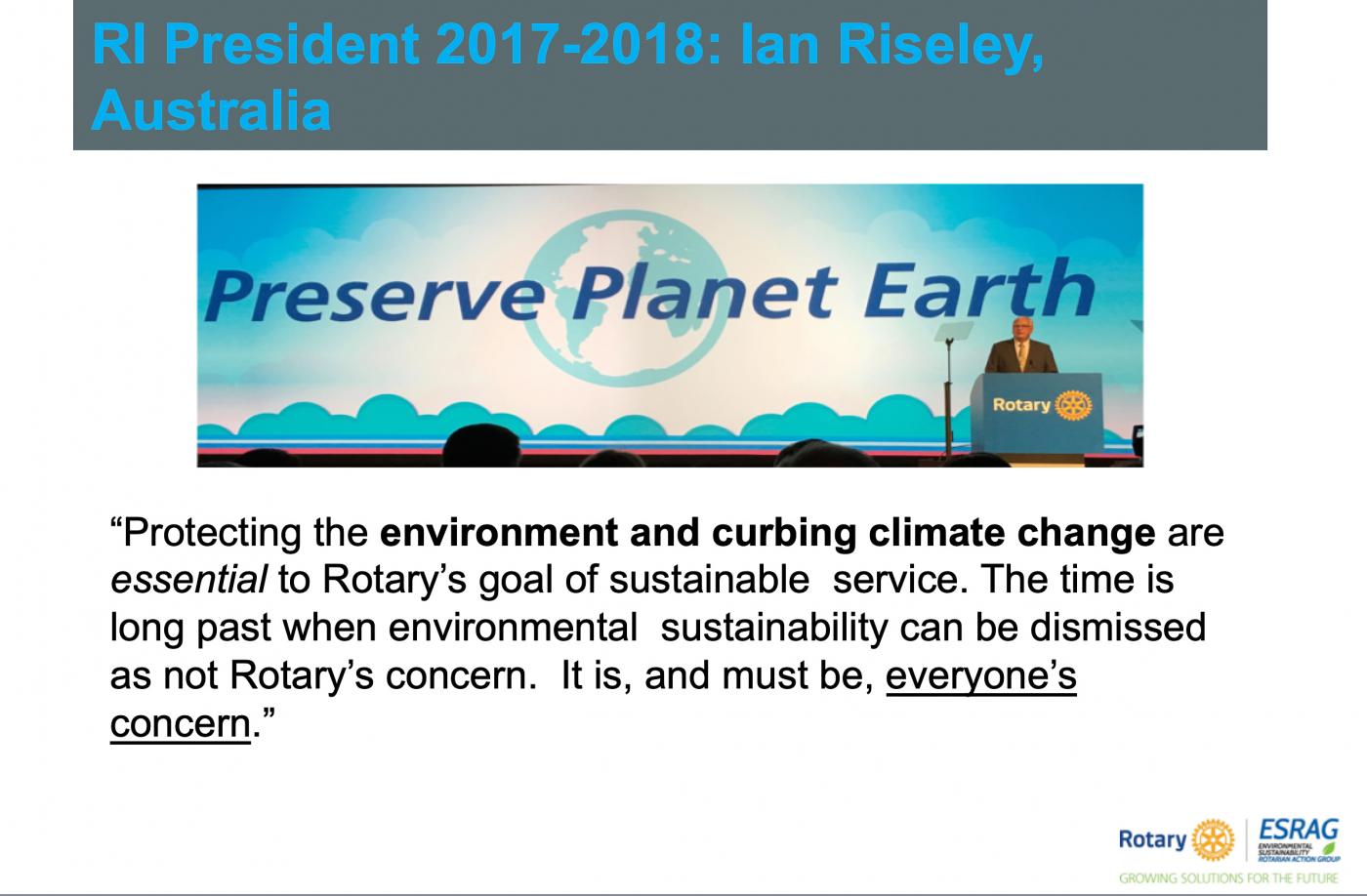
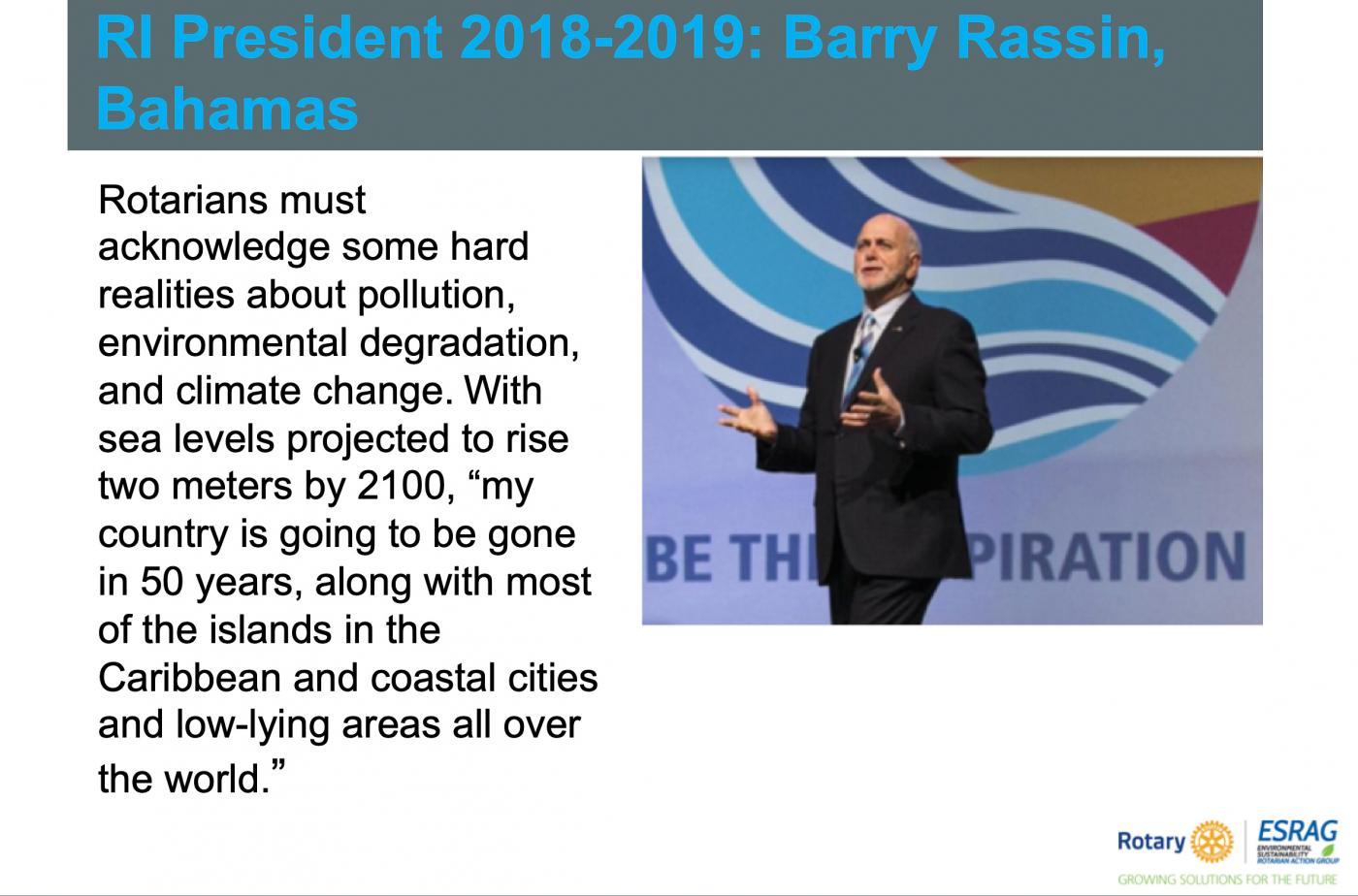
Rotary’s 7th and new Area of Focus opens opportunities to attract new members into the Rotary Family
The Environment: Rotary’s Newest Area of Focus
In June, 2020 the The Rotary Foundation Trustees and the Rotary International Board of Directors voted unanimously to approve the Environment as the seventh Area of Focus. In January, 2021, they finalized the policy detailing the kinds of projects that will now become eligible for Global Grants. The Rotary Foundation will begin accepting grant proposals in July, 2021. As the Foundation prepares to support the new Area of Focus, you can read an overview here.
The Foundation has published Global Grant Policy guidelines, for the Area of the Focus for the Environment, which you can download the new policy here.
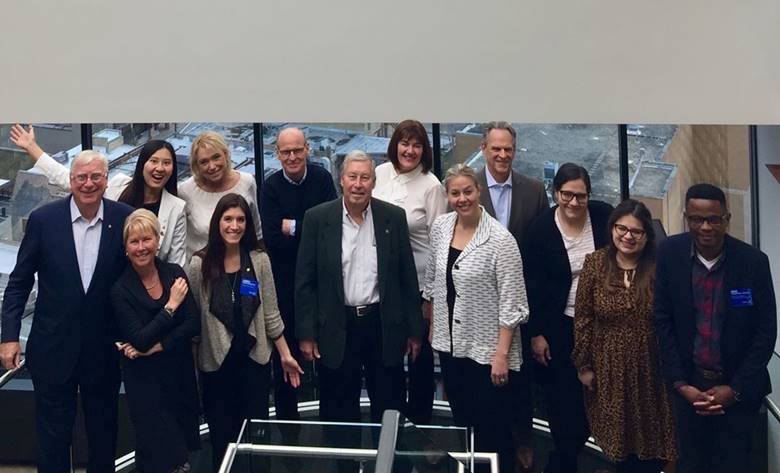
Rotary Past President Ian Riseley posted this picture on his Facebook page June 26, 2020, with this joyful news: “The Trustees and Directors have unanimously accepted our recommendation to create a 7th Area of Focus of our Rotary Foundation, being the Environment. As Chair of the Task Force that put together and argued for this decision, I’m enormously proud today. This photo is of the four Trustees, one Director, and one Rotaracter who comprised the Task Force, plus the outstanding and dedicated staff who assisted us in arriving at our recommendation. Congratulations, team, we just made Rotary history!”
Eligible projects cover an array of fields:
• Protecting and restoring land, coastal, marine, and freshwater resources
• Enhancing the capacity of communities and local governments to support natural resource management and conservation
• Supporting agroecology and sustainable agriculture, fishing, and aquaculture practices to improve ecological health
• Addressing the causes of climate change and climate disruption and supporting solutions to reduce the emission of greenhouse gases
• Strengthening the resilience of ecosystems and communities affected by climate change and climate disruption
• Supporting education to promote behaviors that protect the environment
• Advocating for the sustainable consumption of products and the environmentally sound management of byproducts to build a more resource-efficient economy
• Addressing environmental justice issues and environmental public health concerns
ESRAG supported the creation of a new and unique Area of Focus for the Environment, and our directors and members are thrilled by this decision. ESRAG and its regional chapters are providing an array of online webinars to share lore from sustainability work all around the world. Many include talks from internationally renowned scientists, economists, entrepreneurs, and journalists. In addition, ESRAG’s task forces and teams are available for technical assistance to members of the Rotary family on projects such as renewable energy, carbon offsets, and Project Drawdown-informed solutions.
ESRAG’s GreenPosition Paper about adding the Environment as an AOF is the first in a series of position papers about important environmental topics. You can read this Green Paper, issued January 22, 2020, here: ESRAG’S POSITION ABOUT THE ADDITION OF THE ENVIRONMENT AS AN AREA OF FOCUS
This paper was the basis of Karen Kendrick-Hands’ presentation to The Rotary Foundation’s Environmental Issues Task Force, February 3, 2020, when as ESRAG’s Representative, she travelled to the Rotary International Headquarters, in Evanston, Illinois to present at the opening morning session.
Here are HER SLIDES (7.5 mb) and CLOSING REMARKS.
Stay up to date.
Sign up for monthly updates from ESRAG to
get the latest news straight to your inbox.
Follow us & join the conversation.
#IFixThePlanet
